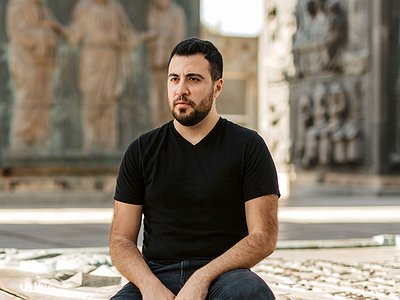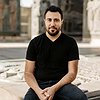Part 2
Could you take me through the process of improvisation on the basis of one of your performances that's particularly dear to you, please? Where did the ideas come from, how were they transformed in your mind, what did you start with and how do you refine these beginnings into the finished work of art?
This really depends on what style of music I am performing and how I’m feeling that day. When playing jazz, I sometimes stay well within the structure of the original song. Other times, I try to break out of it as much as I can until the improvisation sounds almost nothing like the original. For me, improvisation is like exploring an unexplored jungle – you never know what you will find next. I enjoy playing with open minded musicians who are not afraid to experiment with the harmonies they play.
There are many descriptions of the ideal state of mind for being creative. What is it like for you? What supports this ideal state of mind and what are distractions? Are there strategies to enter into this state more easily?
We live in a world full of distractions -- the Internet, Iphones, TV, Twitter, Instagram, the whole nine yards. I try my best to avoid these distractions when working on my music. For me, true creativity comes in isolation. When I sit in front of the piano, I make sure to turn off my phone until I am done with my work.
But I must point out that these new technologies are not inherently bad things; as someone who has friends all around the world, I enjoy using social media to see how they are doing. I read on what's going on around the world and how my family is doing in Georgia. But when it comes to my creative world, I can’t have any distractions near me.
How do you make use of technology? In terms of the feedback mechanism between technology and creativity, what do humans excel at, what do machines excel at?
I think technology is overtaking human beings in a lot of disciplines and it's sometimes hard to compete with the machines. But they also make our work easier and allow us to focus on subtler points in our craft we would normally not be able to work on. Though the music we compose is made with the help of a computer, the music is still inherently human because it is our creation.
Production tools, from instruments to complex software environments, contribute to the compositional process. How does this manifest itself in your work? Can you describe the co-authorship between yourself and your tools?
As I stated in my previous answer, technological innovations open up new frontiers for artists. Composers are now capable of manipulating notes to the exact hertz, something we couldn’t do, say, 100 years ago. The variety of sounds we can now produce are now limitless!
How do you see the relationship between sound, space and performance and what are some of your strategies and approaches of working with them?
Sound is a form of energy. It can be generated, moved, can do work, can dissipate over time and distance, and can carry tremendous amounts of energy. Bringing that energy and vibe to the human ear that is what motivates me and inspires me.
Sound cannot be heard in a vacuum, like outer space. Propagation of it affects how the sound perceived by a listener. When I compose, I always take into consideration how it will sound for an audience in a concert hall or anywhere else I perform, not just for me in a studio.
Our sense of hearing shares intriguing connections to other senses. From your experience, what are some of the most inspiring overlaps between different senses - and what do they tell us about the way our senses work? What happens to sound at its outermost borders?
I prefer to digest my music solely through my ears. I find that anything else interferes with the reception of the music. If I really want to delve into a piece I am listening to, I close my eyes and focus all my attention to the sound of the music. I think sometimes the visual aspect of concerts can distract us from the deeper side of music.
Art can be a purpose in its own right, but it can also directly feed back into everyday life, take on a social and political role and lead to more engagement. Can you describe your approach to art and being an artist?
Nine years ago, I remember how terribly I wanted to get worldwide recognition, so famous that everyone would know my name and my music. Now, I think such aspirations are childish. Art is not about fame or personal recognition; art is a tool to connect people.
The main focus of my musical career is to honour my country, Georgia, and to connect my listeners to the culture that raised me and made me who I am today. Everything I do, from composing to performing, is shaped by my roots and my heritage. I feel it is my artistic duty to promote my country’s culture and traditions in my music. For me, it is all about bringing Georgia’s hidden treasures to the rest of the world.
It is remarkable, in a way, that we have arrived in the 21st century with the basic concept of music still intact. Do you have a vision of music, an idea of what music could be beyond its current form?
Every century has its musical champions. But that’s exactly what they are – they are champions of their era, not ours. We must learn from them without slavishly aping them. We can’t be afraid of breaking new barriers. That is, after all, what those champions of former musical periods did.
Lately, I think most musical innovation of our day comes from the electronic music scene. A lot of what I’ve heard there has not made it to other genres. It’s absolutely novel. These musicians of the electronic genre, however, are little known outside of their genre. But I think, with time, they will get the recognition they deserve.






